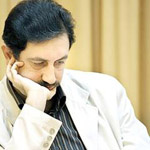Seeds of Change, Not a Good Time to Sprout
How Iran lost the opportunity to reorient its ties with the international community last year. By Hossein Salimi

In the light of remarkable developments in international affairs, the last Persian year had highest potentials for Iran to re-regulate its relations with the international community and initiate a new era in its foreign diplomacy. The age of unilateralism had come to an end and Americans had decided to change their behavior which meant a multilateral attitude that engaged other influential countries and forces to solve international crises.
It was also a special year for global economy. Despite the hardship brought to most economies across the world triggered by real estate crisis in the United States, a fortunate by-product was the transformation of global economic relationships. From now on, economy of states will move towards increasing globalization.
Waves of change left Iran confronted with crucial diplomatic decisions to make. This new era will hardly observe classic conflicts between states, nor would it face other-denying definition of identity. It is a period of convergence and cooperation, albeit never devoid of competition, among global actors.
At one period it seemed that decision-making circles in Iran have appreciated those developments and intend to respond constructively. A series of events stopped this attitude shift short of bringing its effect to the Iranian diplomacy however, sending Iran back to the age of classic conflict.
Most effective were indeed the post-election protests. The intense ‘Green Wave’ brought suspicion to Iranian leaders, prompting them to accuse foreign countries, particularly the US and UK, of plotting against the Islamic Republic. Western powers’ harsh response merely aggravated the row. A swaying stance over the nuclear challenge also affected Iran’s foreign diplomacy. A one-week honeymoon between Iran and countries critical of its nuclear program (particularly Russia and West) made many believe that we are only one step away from resolution of the dispute. Things went back to square one mostly due to internal agreement inside Iran over West’s nuclear proposal which some regarded as a hoax to snatch from Iran its enriched uranium stockpile. Iran’s relations with West turned stormier as far-right –the major threat to Middle East peace process- rose to power in Israel and the Taliban challenge in Afghanistan turned tougher than ever.
It was a year with the potential to bring winds of change to Iranian foreign policy, but internal tumult, regional crises and international face-offs never allowed seeds of change to sprout. Seeds are not dead however, they need a brighter sun and a more temperate climate.
It was also a special year for global economy. Despite the hardship brought to most economies across the world triggered by real estate crisis in the United States, a fortunate by-product was the transformation of global economic relationships. From now on, economy of states will move towards increasing globalization.
Waves of change left Iran confronted with crucial diplomatic decisions to make. This new era will hardly observe classic conflicts between states, nor would it face other-denying definition of identity. It is a period of convergence and cooperation, albeit never devoid of competition, among global actors.
At one period it seemed that decision-making circles in Iran have appreciated those developments and intend to respond constructively. A series of events stopped this attitude shift short of bringing its effect to the Iranian diplomacy however, sending Iran back to the age of classic conflict.
Most effective were indeed the post-election protests. The intense ‘Green Wave’ brought suspicion to Iranian leaders, prompting them to accuse foreign countries, particularly the US and UK, of plotting against the Islamic Republic. Western powers’ harsh response merely aggravated the row. A swaying stance over the nuclear challenge also affected Iran’s foreign diplomacy. A one-week honeymoon between Iran and countries critical of its nuclear program (particularly Russia and West) made many believe that we are only one step away from resolution of the dispute. Things went back to square one mostly due to internal agreement inside Iran over West’s nuclear proposal which some regarded as a hoax to snatch from Iran its enriched uranium stockpile. Iran’s relations with West turned stormier as far-right –the major threat to Middle East peace process- rose to power in Israel and the Taliban challenge in Afghanistan turned tougher than ever.
It was a year with the potential to bring winds of change to Iranian foreign policy, but internal tumult, regional crises and international face-offs never allowed seeds of change to sprout. Seeds are not dead however, they need a brighter sun and a more temperate climate.

